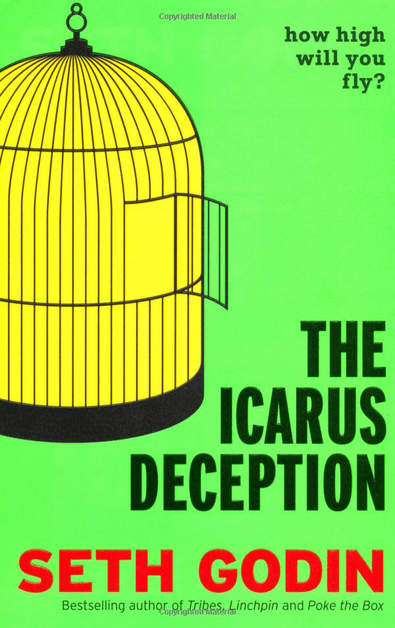After reading Seth Godin’s book “The Icarus Deception”. It’s an important book for me. I suspect it is for others too.
I’ve highlighted some of the words that stuck in my mind when reading and want to discuss this at A.nnotate.com and have produced a slideshare of the captures.
The book is a very easy and quick read. The voice of the narrative reminded me somewhat of the Cluetrain Manifesto that was produced in the late 90’s. It’s not written in the normal way ( scientific, deductive, hyper referenced). It is awash with metaphor and a call-to-action style of motivational sound bites. Seth is very clear in his objectives for this book. Stop doing what other people are telling you to do and start creating! Create things and connect the things you produce to real people. Do this in order to create change.
He is clear in his view that industrial cultures have little to offer to solving today’s problems and almost (note I said almost) goes as far as saying that industrial approaches have nothing left to teach us or offer for our futures. Creativity is now the only thing that matters.
At the heart of the book is the message that everyone needs to be creative in today’s networked economy (which he refers to as the ‘connection economy’). He successfully uses ‘art’ as a metaphor for the type of creation that everyone should be preoccupied with. Seth suggests three stages: Seeing, Making and Starting with a blank sheet of paper.
The majority of the book is taken over with convincing arguments for perceiving the post-industrial world entirely differently. For viewing industrialism as ‘job done’ and to building the argument that our world now is about infinite-sum games not zero-sum games of maximising output and economic races-to-the-bottom. In my view the book’s strength lies in this area. Building the case for a change of viewpoint and perspective.
Seth makes the point that producing art requires significant pain and resistance (he refers to one’s ‘lizard brain’ which constantly sows fear, uncertainty and doubt and creates a paralysis of productivity). He is very clear that producing art is not without pain. Significant pain is necessary, in fact. But when all is said, this type of production (and especially the journey rather than the destination) is what really matters and is the essence of being human. He contrasts this with being told what to do and with having one’s creativity and freedom of expression suppressed. He believes these are necessary ‘features’ of our industrial systems?
I’d recommend that everyone reads this book!
What do you think? Is producing Art the only thing that now matters?
